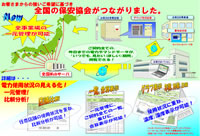Activities
Safety Management Service
Safety Management Service
We conduct supervision of the safety of the construction, maintenance and operation of Electric Facilities for Private Use(see Note 1) which have obtained Outsourcing Approval (see Note 2).
Monthly Inspection
As a general rule once per month (*), we conduct inspection and measurement of each user's Electric Facilities for Private Use, and report the results to the user.
(*) This frequency can be changed to "at least once per two months" if the user's electric facilities are equipped with an insulation level monitoring device used for 24-hour monitoring of electric leakage; or "once per two months to six months" depending on the scale and other conditions of the electric facilities.
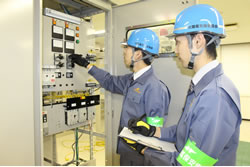 (Hokuriku Electrical Sefety Inspection Association)
(Hokuriku Electrical Sefety Inspection Association)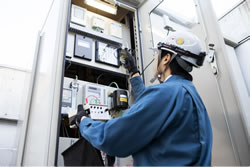 (Hokkaido Electrical Safety Services Foundation)
(Hokkaido Electrical Safety Services Foundation)
Annual Inspection
As a general rule once per year (*), we conduct measurement and testing of each user's Electric Facilities for Private Use by temporarily shutting down the electricity, and report the results to the user.
(*) The frequency of this Blackout Inspection can be changed to "once per three years" depending on the conditions of the user's electric facilities.
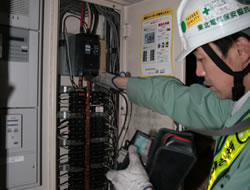 (Tohoku Electrical Safety Inspection Association)
(Tohoku Electrical Safety Inspection Association)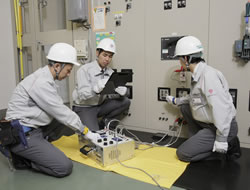 (Kanto Electrical Safety Services Foundation)
(Kanto Electrical Safety Services Foundation)
Extraordinary Inspection
If it becomes necessary to investigate into causes of abnormality in users' electrical facilities, or in the cases of typhoons, snowfalls or other situations which may cause an electrical accident, we perform Extraordinary Inspection and take other actions as necessary.
Emergency Response to Electrical Accidents
In the event that an emergency situation arises in a user's electric facilities, such as malfunction or other abnormalities, or an emergency disaster requiring first-aid action, we provide Emergency Response Service, always being ready to respond promptly on a 24-hour 365-day basis.
Testing & Technical Service
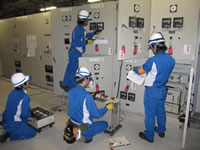
(Kyushu Electrical Safety Inspection Association)
We conduct inspection and measurement of Electric Facilities for Private Use in business sites at which one or more licensed chief electrical engineers are appointed. Our Testing & Technical Service also includes guidance on regulatory procedures (such as submission of necessary documents to government authorities), PCB content analysis, dielectric strength tests for protective equipment, and more.
Energy-Saving Assistance
We provide assistance to users' energy-saving diagnosis and to development of managerial standards, periodic report documents, mid- and long-term plans and plant & equipment registers based on the Energy Saving Act (Law Concerning the Rational Use of Energy).
Demand Monitoring Service
Demand Monitoring Service provides constant monitoring of each user's maximum demand power ("Demand") used for determining the base rate of the electricity charge, and informs the user by alerts and a lamp so that the Demand will not exceed the controlled target value.
The Demand Web Plan enables users to conduct more detailed control of their electricity consumption by browsing the consumption amount on a daily, monthly and yearly basis together with temperature and humidity data, and also enables centralized and consolidated management of Demand data of the user's all business sites throughout the country by utilizing the network of all of the 10 Electrical Safety Inspection Associations in Japan.
(Note 1)
Definition of "Electric Facilities for Private Use
According to Article 38 of the Electricity Business Act, the term "Electric Facilities for Private Use" is defined as "Electric Facilities other than Electric Facilities used for Electricity Business and Electric Facilities for General Use". The following facilities and business sites are classified into Electric Facilities for Private Use:
Electric facilities which use electricity received from an electric power company or other source at a voltage higher than 600V
Typical examples of these facilities include those used in factories, office buildings, schools, hospitals, hotels, sports facilities, amusement facilities and other business sites which receive electricity at a 6kV-class High Voltage or a 20kV or 60 kV-class Extra High Voltage.
Power generation equipment and electric facilities which use the electricity so generated
Electric facilities in business sites which receive electricity at a Low Voltage (600V or lower) are also classified into Electric Facilities for Private Use if they have a power generation equipment other than a Small Capacity one. For example, if electric facilities in a business site receiving electricity at a Low Voltage have an emergency diesel generator installed in the premises, and if the generator's power output is 10kW or higher, these facilities and equipment are deemed as Electric Facilities for Private Use.
[Definition of "Small Capacity Power Generation Equipment"]
Photovoltaic (i.e. solar cell) power generation equipment having a power output lower than 50 kW; wind power generation equipment having a power output lower than 20 kW; hydraulic (i.e. water) power generation equipment having a power output lower than 20 kW (excluding those with a dam); thermal power generation equipment driven by internal combustion having a power output lower than 10 kW; and fuel cell power generation equipment having a power output lower than 10 kW (limited to the polymer-electrolyte type having a maximum allowable working pressure of less than 0.1MPa)
Electric facilities having an electric line extending beyond the premises
Furthermore, electric facilities in business sites which receive electricity at a Low Voltage are classified into Electric Facilities for Private Use if they have one or more electric lines extending to another Electric Facilities located outside the premises. This is because electric lines extending beyond the premises may cause a hazard to the general public, so these lines need to be maintained and managed in the same manner as distribution lines of electric power companies.
Gunpowder mills and coal mines
Gunpowder mills and coal mines have a risk of ignition and explosion, where defects in electric facilities may cause a serious disaster. Therefore, any and all Electric Facilities in gunpowder mills and coal mines are deemed as Electric Facilities for Private Use, regardless of their receiving voltage and power capacity.
(Note 2)
Outsourcing Approval System
Business sites equipped with Electric Facilities for Private Use are required to appoint one or more licensed chief electrical engineers from among their employees and cause them to supervise the safety of the construction, maintenance and operation of the Electric Facilities for Private Use, pursuant to Article 43 of the Electricity Business Act. However, these business sites are allowed to outsource such supervisory function to a qualified third-party individual or entity engaging in electrical safety service if the following conditions are met:
-The business site's Electric Facilities for Private Use fall under any of the criteria [1] to [3] specified below,
-The business site has entered into an outsourcing agreement with such electrical safety service provider who must meet certain requirements enforced by the national government, and
-The business site has obtained approval of the Head of the relevant regional Industrial Safety Division of the Ministry of Economy, Trade and Industry (METI).
(Article 52.2 of the Regulations for Enforcement of the Electricity Business Act)
The 10 Electrical Safety Inspection Associations in Japan all meet the requirements as a qualified electrical safety service provider mentioned above.
Electric Facilities for Private Use eligible for such outsourcing are:
- Demand Facilities which receive electricity at a voltage lower than 7,000V
- Power generation plants having a voltage of 7,000 kW or lower and falling under the following criteria:
- (1)Photovoltaic (i.e. solar cell)power generation plants having a power output lower than 5,000 kW
- (2)Hydraulic (i.e. water), thermal, or wind power generation plants having a power output lower than 2,000 kW
- (3)Any power generation plants having a power output lower than 1,000 kW (excluding those mentioned in (1) (2)above)
- Business facilities managing a distribution line having a voltage of 600V or lower
In the cases where an outsourcing agreement is executed, an Electrical Safety Inspection Association or other qualified electrical safety service provider will perform supervision of the safety of the construction, maintenance and operation of the Electric Facilities for Private Use, on behalf of the business site's licensed chief electrical engineer(s).In these cases, Electrical Safety Inspection Associations will also support necessary regulatory procedures, including preparation of the business site's safety regulations and submission thereof to the relevant Industrial Safety Division of METI, which is the competent authority for electrical safety affairs.

